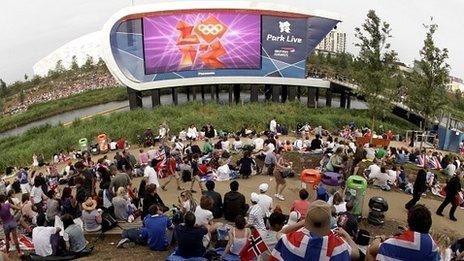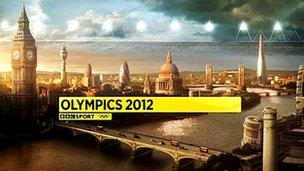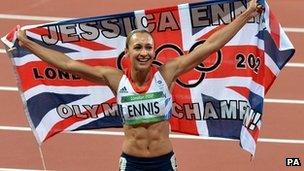London Olympics give boost to media
- Published

People weren't just watching the games at home
For the media, as for the nation as a whole, it was a remarkable fortnight - and it wasn't just in the sports arenas that records tumbled.
In living rooms, offices and further afield, followers of London 2012 helped the BBC achieve record levels of viewing and internet access - fulfilling the corporation's aspiration to deliver the first truly digital and mobile Olympics.
Almost 52 million people - 90% of the UK population - watched the Olympics for at least 15 minutes, the BBC said.
That made it the biggest national television event since the current ratings system began - ahead of the 2002 World Cup, the Queen's Diamond Jubilee and the wedding of Prince William and Kate Middleton.
In addition, 24 million people - 42% of the UK public - watched coverage on one or more of the BBC's 26 dedicated Olympic TV channels, making it - in the view of London's Evening Standard - the "red-button Olympics", external.
And there was a global audience of 55 million browsers (37 million in the UK) of BBC Sport's online coverage, including live and catch-up video of every event.
BBC Future Media's Phil Fearnley said the audience's response had exceeded expectations. "Our aspiration was to do for digital what the Coronation did for TV in 1953," he explained.
"The demand and astonishing feedback we've seen from audiences accessing our Olympics content online, whenever they want on the devices they choose, has helped fulfill this aspiration."
The Top 10 Olympics events all had peak TV audiences of more than 12 million viewers, external, The Guardian noted.
The highest were achieved not by sports events but by the Games' cultural "book-ends" - the opening and closing ceremonies.
Some 26.3 million UK viewers tuned in at the peak moment when the athletes' flag bearers paraded into the stadium for the closing ceremony.
Two weeks earlier, 27.3 million watched Mr Bean help Sir Simon Rattle perform Chariots of Fire during Danny Boyle's spectacular opening event.
Despite lasting more than three hours each, both ceremonies held onto most of the viewers throughout - gaining average audiences of more than 22 million.
On the sports front, 20 million watched Usain Bolt's gold in the 100 metres final, while 17 million saw Mo Farah win the 10,000 metres on the first Super Saturday when Britain won six golds.

London landmarks featured prominently in the BBC's Olympic promos
A week later, almost 16 million saw Tom Daley take the bronze medal in the 10m platform diving final.
Around 6 million were watching on BBC Three, one of the channel's highest ever audiences, external.
There were many plaudits for the BBC's wall-to-wall coverage, though some newspapers felt its interviewers got too "touchy-feely", external with some of the medal winners.
The BBC also denied a report that its director general Mark Thompson had criticised the coverage for focusing too much on British successes, external, after Time magazine's European editor Catherine Mayer expressed surprise at the corporation's "jingoistic" coverage.
Like the BBC, Britain's newspapers invested heavily in their coverage of the Games. Like the broadcasters, their headline-writers and columnists soon ran out of superlatives.
Most papers ran special supplements and souvenir issues throughout the fortnight, packed with photographs.
Though official sales figures have not been published yet, many say they have shared in the Olympics bonanza by gaining extra sales and advertising revenue.
Unofficial figures suggest the Sunday Times sold an extra 71,000 copies, external and the Sunday Telegraph an extra 50,000 after the first Super Saturday.
The day after Danny Boyle's opening ceremony, The Times is reported to have sold an extra 100,000 papers.
Free newspaper Metro said it also had a big increase in advertising revenue, external, with 50 advertisers targeting the Olympics audience. During the games it published on Saturdays and Sundays and will do so again during the Paralympics.

Some 16 million people saw Jessica Ennis win the Heptathlon gold
Yet with so many images, facts and figures to report, the pressure on those producing the papers began to show.
One morning the Daily Mirror and Daily Express celebrated the victory of Great Britain's dressage equestrian team by mistakenly printing pictures of the bronze-medal team from the Netherlands. A picture agency had supplied the wrong caption.
It was also the first real social media games, with millions of people - including many of the athletes themselves - commenting on Twitter.
But it also brought out the worst in the Twitter trolls, leading Blue Peter presenter Helen Skelton to close her account, external. One teenager was arrested after sending an abusive tweet to Tom Daley.
The BBC's huge ratings success was bad news for commercial broadcasters, particularly ITV which suffered its worst-ever daily and weekly ratings, external.
Channel 4 now has the chance to make its own mark with its coverage of the Paralympics, after winning the TV rights from the BBC.
As the Olympics came to its spectacular close, the company began a heavy marketing campaign, external for the next sporting extravaganza.
Its slogan? "Thanks for the warm-up."
- Published14 August 2012
- Published13 August 2012